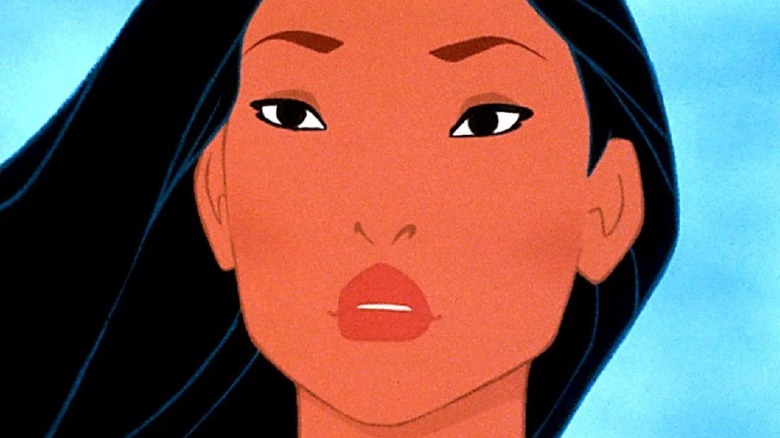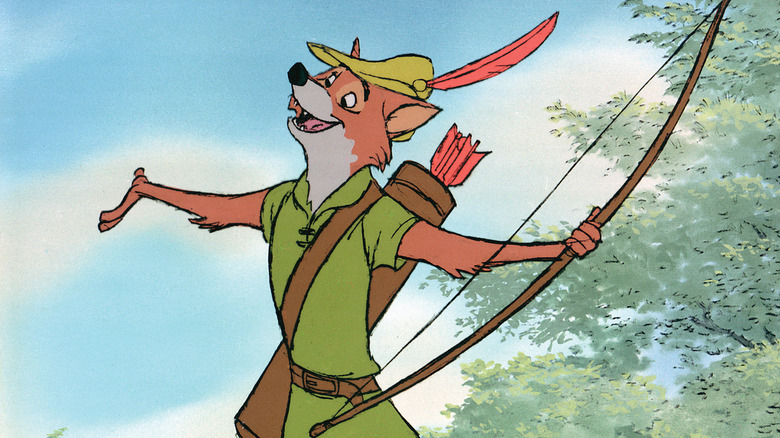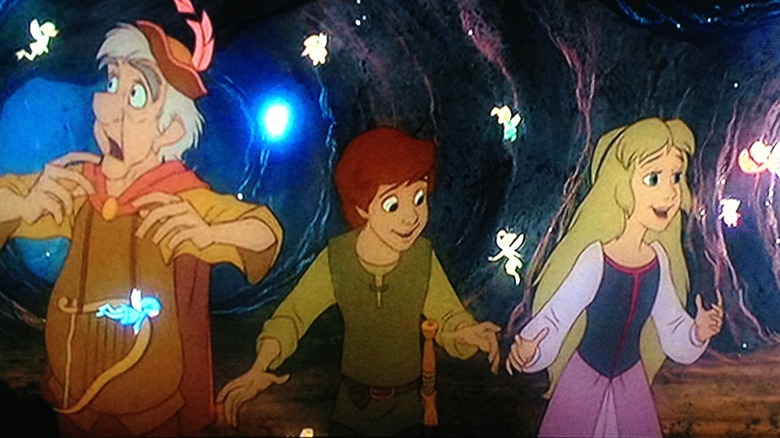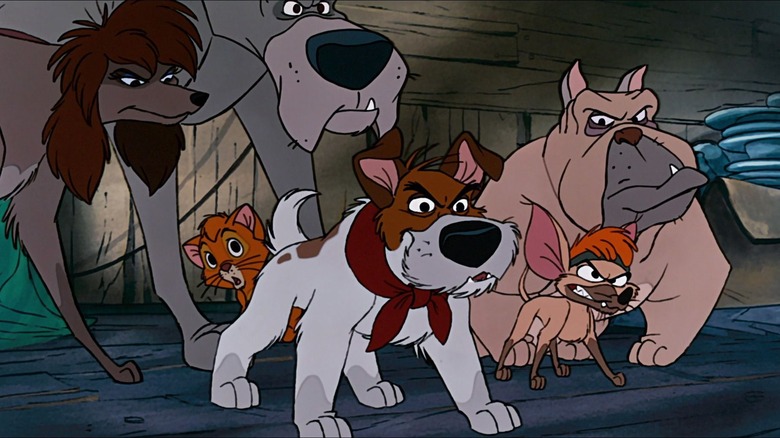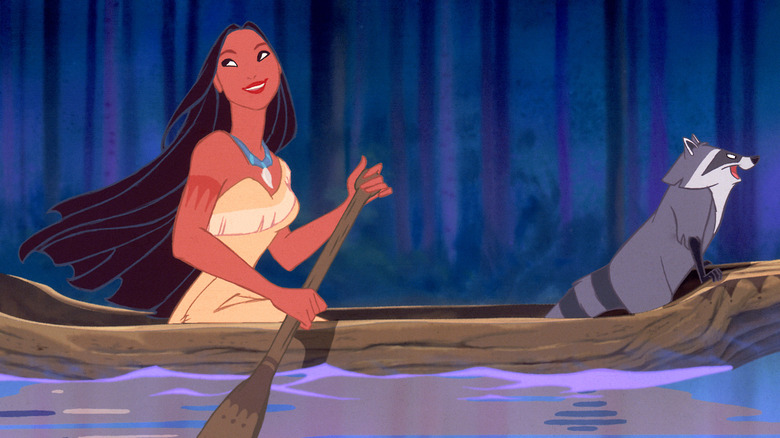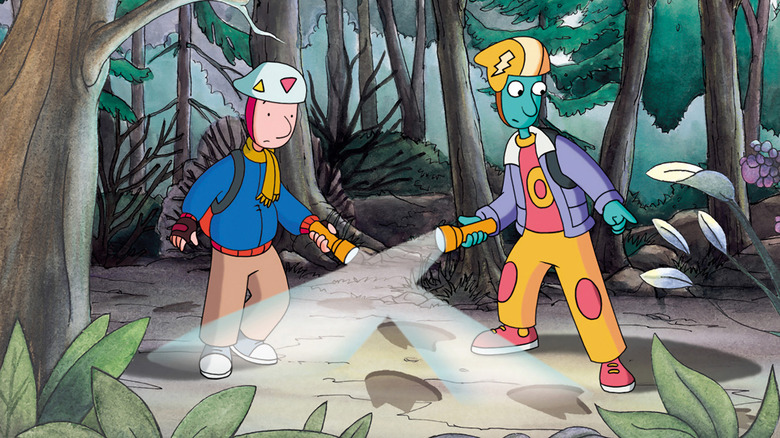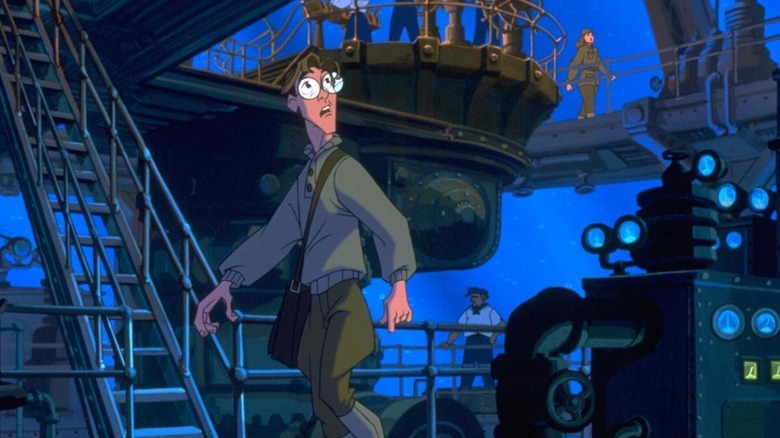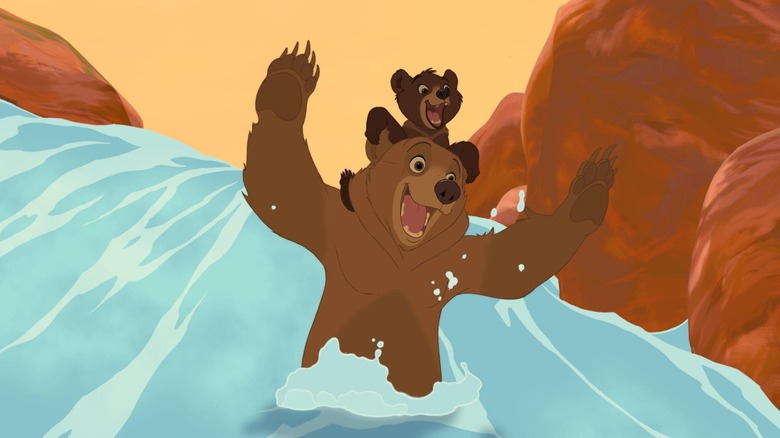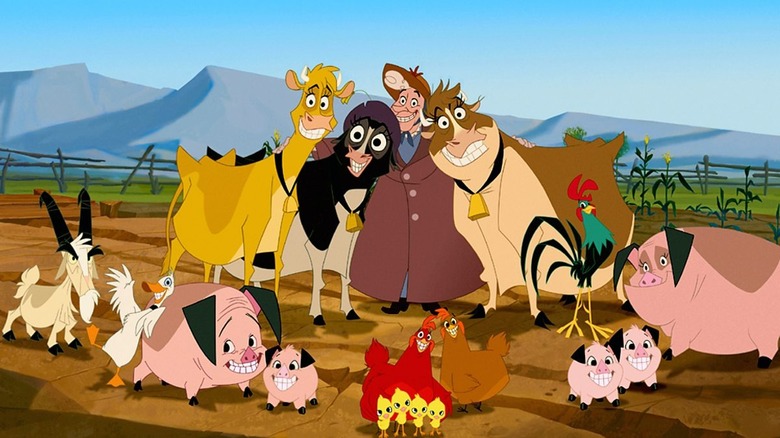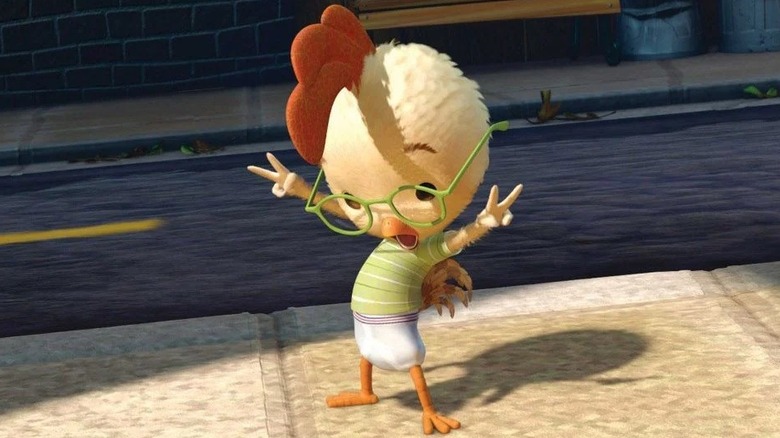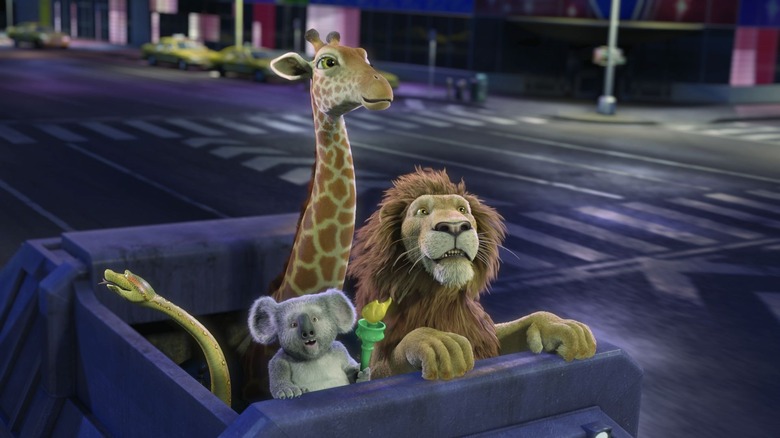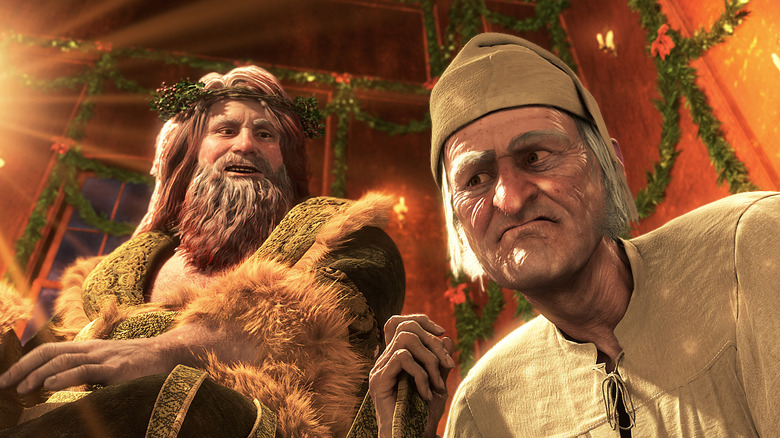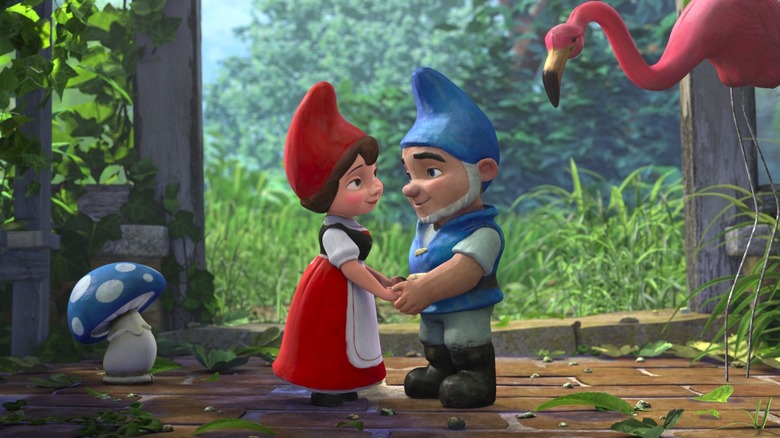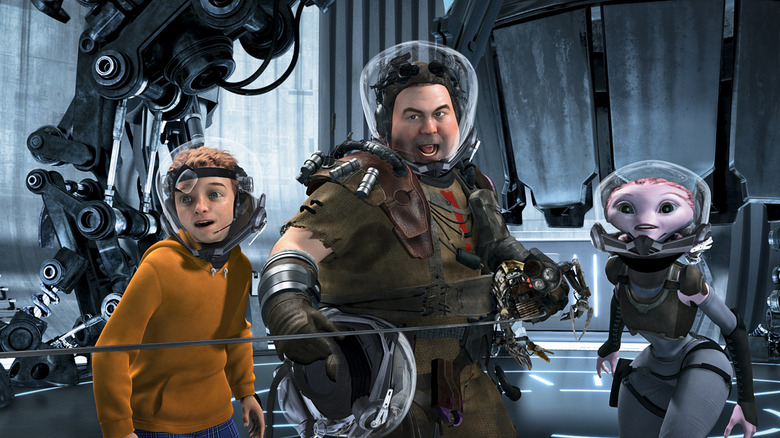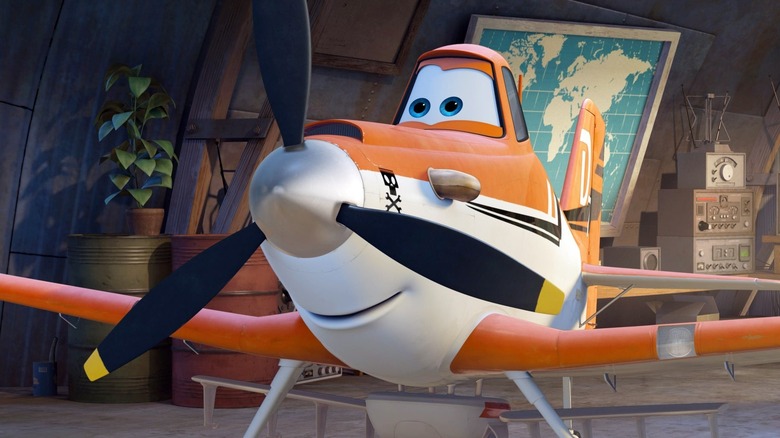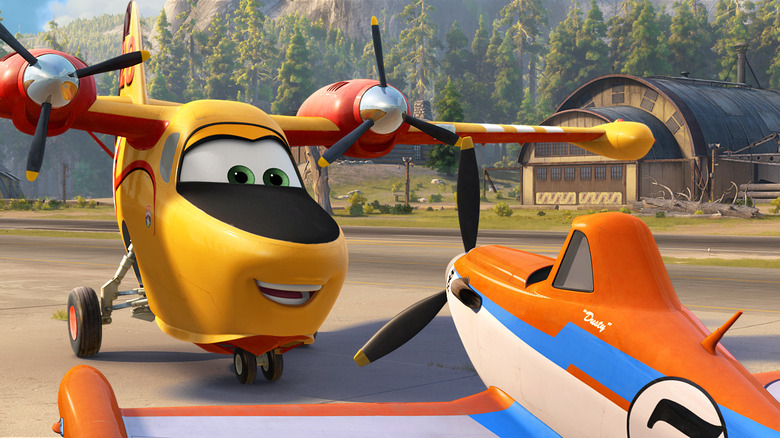Disney Animated Movies With A Rotten Score
The cornerstone upon which the House of Mouse was built, Disney's animated films have earned an iconic reputation over the decades, dazzling critics and moviegoers alike. Many of the studio's early releases are widely regarded as classics of animation, while more modern fare like the "Frozen" films have pulled in billions at the global box office. But that doesn't mean every single animated movie that Disney has put into theaters has received acclaim. The studio has dropped several animated duds across the years, and — as a quick glance at Rotten Tomatoes tells us — the critics haven't always been kind.
From romantic comedies and action films to epic musicals gone wrong, we're reaching into the darkest corners of the Disney library to bring you a list of the worst animated movies in the company's history. While the stories and tones may vary, these films have one thing in common: They all scored less than 60% on Rotten Tomatoes and therefore have a "rotten" rating on the website.
Robin Hood (1973)
The era of Walt Disney Animation Studios directly after the death of Walt Disney was an awkward one. Those left at the top were struggling for direction, with the phrase "What would Walt do?" quickly becoming the new motto. This led to a lot of features reminiscent of classic Disney, including "Robin Hood." The studio opted to retell the classic tale of a thief who takes from the rich and gives to the poor with talking animals and a lot of reused animation — some sequences are practically identical to previous Disney films, and this didn't go unnoticed.
"Robin Hood" was quintessentially Disney in many respects. The presence of actors like Phil Harris as Little John (Harris brought another famous bear to life five years earlier in "The Jungle Book," playing Baloo to perfection) gave the film a certain prestige. The critical reaction was mixed, however, and it remains so to this day — the fox-led feature holds a score of 55% on Rotten Tomatoes. Critics found it too slow for its own good and complained that the jokes didn't land like they should.
The Black Cauldron (1985)
"The Black Cauldron" is infamous among Disney fans. Released in 1985, the studio's first PG-rated title baffled critics. It was supposed to be a showcase for Disney's darker side, but the reaction soon sent the House of Mouse scurrying back towards princesses.
Writing in The New York Times at the time, critic Walter Goodman said that he was frustrated by "The Black Cauldron," especially by how the film's ambition was undercut by extremely familiar staples of classic fantasy storytelling. He also noted that the villains of the feature, including John Hurt's Horned King, were far more interesting than the forgettable heroes of the story.
With these kinds of shortcomings, it's no wonder "The Black Cauldron" failed to meet expectations critically, let alone open new avenues for Disney. While it has gained a cult following in the years since, its reputation hasn't improved enough for it to be considered "fresh" on Rotten Tomatoes: "The Black Cauldron" holds a score of 55%.
Oliver & Company (1988)
The year before the so-called Disney Renaissance began with "The Little Mermaid," the studio released the little-seen "Oliver & Company," a contemporary take on "Oliver Twist" starring a cast of cats and dogs. "Oliver & Company" had a decent box office run, but it didn't fare quite as successfully with critics. Many complained that it suffered from a lack of all-ages entertainment, a contrast to vintage Disney features that could enthrall moviegoers from all demographics. However, it wasn't just this flaw that earned "Oliver & Company" a bad reputation.
Writing in The Chicago Tribune, Gene Siskel was highly critical of the musical numbers. He found that they interrupted the story more often than not, and he also felt the whole production paled in comparison to earlier Disney pictures. A later review from Film4 singled out the animation and screenwriting as lackluster. While "Oliver & Company" does contain a few mild laughs, it was ultimately overshadowed by "The Little Mermaid" and more or less forgotten about. It has a rating of 50% on Rotten Tomatoes.
Pocahontas (1995)
The 1990s was a great time to be a Disney fan, with the likes of "The Lion King" and "Aladdin" taking the studio to new heights. However, not every title dropped by Disney in this era was a runaway hit. "Pocahontas," a big, splashy musical about the iconic indigenous woman of the same name, was rare in that it was inspired by real events rather than fairy tales or folklore. It featured (heavily fictionalized versions of) historical figures and events, and attempted to touch on some weighty issues. With Mel Gibson in the role of John Smith, the film really swung for the fences, but it ended up splitting the critics — it holds a score of 55% on Rotten Tomatoes.
In the years since its release, "Pocahontas" has often been put under the microscope for further inspection, and the results are rarely good. In 2021, Pocahontas was dubbed "the most problematic Disney princess" by CBR, which argued that the film was doomed from the start seeing as the character was inspired by Tiger Lily from "Peter Pan," which contains several offensive depictions of Native Americans. Even when it was first released, "Pocahontas" got a lot of criticism thanks to its extremely serious tone and the conventional narrative beats. There just wasn't enough here to make it stand out in the minds of critics.
Doug's 1st Movie (1999)
Theatrical features based on animated Disney TV shows are often made on the cheap and released to little fanfare. However, this doesn't mean they're always bad. "Recess: School's Out" and "Teacher's Pet" both got positive reviews from critics and proved to be entertaining, fleshed-out films rather than just drawn-out episodes. The same cannot be said for 1999's "Doug's 1st Movie," in which Doug finds and befriends a strange toxic creature.
Paul Tatara of CNN was among the many critics who took "Doug's 1st Movie" to task, labeling it "an 'E.T.' rip-off" and criticizing the subpar animation. These complaints were echoed in the vast majority of reviews — the film has a damning score of just 26% on Rotten Tomatoes. Turning an animated Disney TV show into a theatrical feature is not always a recipe for disaster, but "Doug's 1st Movie" is far from the best of the bunch.
Atlantis: The Lost Empire (2001)
"Atlantis: The Lost Empire" was Disney's attempt at an animated action blockbuster. The film was designed to have explosions to spare and an expansive scope that, if all went according to plan, would reshape what the public thought Disney Animation capable of. But the best-laid plans tend to go awry and so it was with "Atlantis: The Lost Empire." Rather than blow the minds of critics and moviegoers, the poorly-paced movie got mixed reviews. The film, largely regarded as lacking a human touch, has an underwhelming 49% rating on Rotten Tomatoes.
The biggest problem with "Atlantis: The Lost Empire" is that it lacks the fun of its predecessors. Stephanie Zacharek of Salon was among the critics who were baffled by Disney's decision to make something more geared towards adults, a choice that informed the dull atmosphere of the film. "Midway through I found myself longing for a dancing gargoyle, a singing candlestick, a piece of toast wearing a diaper, anything to crack the classy sophisto-sheen that coats every frame," Zacharek lamented. "A little bit of tackiness would at least give 'Atlantis' some life." Rather than being a positive game-changer for the studio, "Atlantis: The Lost Empire" was a big letdown.
Brother Bear (2003)
Many animated Disney films from the early 2000s, like "Dinosaur" or "Treasure Planet," tried to upend the conventional public image of animated Disney titles. The 2003 feature "Brother Bear," meanwhile, was something that aimed to be quintessentially Disney. The story of a man transformed into a bear so that he can learn some life lessons, "Brother Bear" was very reminiscent of older Disney fare. Hitting all the beats of past Disney titles didn't automatically turn "Brother Bear" into the modern incarnation of "The Lion King" for critics, though. In fact, the majority were highly unimpressed by this project.
Entertainment Weekly gave "Brother Bear" a C grade while commenting on its derivative nature, observing how the film was leaning almost entirely on mimicking vintage Disney features. This perception was echoed by The Los Angeles Times, which found it too lacking in originality to stand out. Everywhere one looked there was a review of "Brother Bear" giving it a shrug and noting how it was staunchly committed to replicating older Disney movies. This opinion defined the grizzly critical response that "Brother Bear" received — it holds a 37% score on Rotten Tomatoes.
Home on the Range
Speaking on the podcast The Look Back Machine, "Home on the Range" co-director John Sanford said that the main reason the film didn't catch on with audiences was that the premise was inherently uninteresting. Comparing it to the extreme underdog story of "Finding Nemo," Sanford saw in hindsight why nobody was vaguely interested in a story about bovine bounty hunters. "Who cares?" he said. Today, he gives out copies of the film on DVD as joke gifts to his friends, but it wasn't a laughing matter at the time.
"Home on the Range" dropped when Disney was under pressure from its newly established rival DreamWorks, and the House of Mouse could have done without all the negative reviews. Roger Ebert, for one, criticized "Home on the Range" for its lack of cross-generation appeal and its uninspired songs. The film was supposed to be Disney's last hand-drawn feature (this would not be the case) and many saw it as the studio going out with a whimper. It holds a score of 53% on Rotten Tomatoes.
Valiant (2005)
By the early 2000s, the relationship between Disney and Pixar had become strained. The deal the two studios had in place was set to expire, and for a while it appeared as though Pixar would strike out on its own. As such, Disney began working with other animation companies to test the water. This led to the Mouse House collaborating with Vanguard Animation on "Valiant," the tale of a plucky pigeon determined to help the Allies triumph in World War II.
This bold swing by Disney didn't yield much in the way of positive reviews. "Valiant" was dismissed by critics as unpolished and lacking in narrative. Mike Clark of USA Today was among the many critics who compared it to "Chicken Run," the similarly-themed stop-motion film that dropped to rave reviews five years earlier. "Valiant," meanwhile, scored just 32% on Rotten Tomatoes. Disney quickly realized that the best course of action was to buy Pixar — just six months after the release of "Valiant," a $7.4 billion deal was announced.
Chicken Little (2005)
"Chicken Little" was Disney's reaction to the box office success of films like "Shrek." The story of a little chicken on a big adventure (he gets caught in the middle of an alien invasion), "Chicken Little" is packed with smarmy humor, pop culture references, and bathroom gags. There's a few laughs in there, but the general consensus was that Disney jumped on the bandwagon. They were no longer the studio that set the trends, and the critics were keen to point that out.
Peter Bradshaw of The Guardian was shocked at how poorly realized the various jokes aimed at grown-ups were, citing the scene in which a pig "unamusingly reveals that he has a Barbra Streisand record collection." Roger Ebert conceded that while some gags were mildly amusing, the film "doesn't have the universal appeal of some of the best recent animation." In attempting to mimic tried-and-true routes to box office success, "Chicken Little" just inspired dismissal from critics. The film scored 36% on Rotten Tomatoes.
The Wild (2006)
"The Wild" is a Disney-produced film about a bunch of animals that escape from Central Park Zoo and embark on an adventure that takes them home. Coming just a year after the DreamWorks film "Madagascar" (in which a group of pampered animals from the exact same zoo are forced to spend time in the wild), it was instantly dismissed as a pale imitation. "Madagascar" wasn't exactly a hit with the critics, but it wasn't a total washout. "The Wild," meanwhile, was near-universally panned, coming away with a Rotten Tomatoes score of just 19%.
The negative responses went much deeper than observing how "The Wild" was similar to "Madagascar," though. The Austin Chronicle took particular issue with the lack of quality jokes and engaging plot elements. The BBC was frustrated by the constant attempts at introducing new sidekicks, which made for an exhausting and underwhelming movie experience. Even if "Madagascar" had never existed, "The Wild" wouldn't have thrived. The sole good thing about this film is William Shatner's lively vocal performance as the nefarious wildebeest Kazar.
A Christmas Carol (2009)
It's easy to see why Disney greenlit 2009's "A Christmas Carol." The combination of director Robert Zemeckis ("The Polar Express") and leading man Jim Carrey ("The Grinch") seemed like a winning one for a family Christmas movie. The trouble with "The Polar Express" and "The Grinch" is that, while they've become holiday classics in the years since, they didn't impress the critics at the time. "A Christmas Carol" met the same fate, scoring just 53% on Rotten Tomatoes.
Unlike the Disney-produced film "The Muppet Christmas Carol," which was positively received back in 1992, "A Christmas Carol" didn't find the right tone. The scary parts of the story were too dark for younger viewers, and the lighter scenes too sickly for adults. Peter Howell of the Toronto Star was one of many reviewers who were critical of the motion capture technology and the way it restrained the facial expressions of Carrey in particular.
Gnomeo & Juliet (2011)
As the Shakespeare inspired title implies, "Gnomeo & Juliet" is a classic tale of romance featuring gnomes. The two lovebirds belong to rival gnome factions and are urged to stay in their respective yards. It's predictable and uninspired stuff, and even the music of Elton John can't elevate it. The singer co-produced the film through his company Rocket Pictures and would later blame Disney for not promoting it properly. "It could have been a bigger hit if Disney got behind it more," he said (via Vulture). "They're so ashamed, and they should be ashamed of themselves."
John was proud of the film's box office haul (it ultimately made over $190 million worldwide), but he couldn't have been happy about the critical response. Slant Magazine pointed to the film's overreliance on sarcasm, calling out the creative team for following the snark-heavy direction of many computer-animated titles released around this time. The same complaint came up often in reviews for "Gnomeo & Juliet" and helped define the mixed reception this oddball adaptation received — the film scored 55% on Rotten Tomatoes.
Mars Needs Moms! (2011)
Sometimes, a movie just can't escape its pre-release buzz. So it was with "Mars Needs Moms!," which was produced by ImageMovers Digital. A studio originally meant to produce motion-capture animated features for Disney long-term, IMD was shut down by the Mouse House in January 2010, a little over a year before "Mars Needs Moms!" dropped in theaters. The film had been prejudged as a failure before anyone even saw it. Going by the dismal reviews (it scored 37% on Rotten Tomatoes), they were right to do so.
The biggest issue with the movies made by Robert Zemeckis' motion-capture studio is that the characters all look kind of strange. They're the faces of actors we know, but they look a little weird. It was the same with "Mars Needs Moms!" according to Tom Huddleston of Time Out. "The 'Polar Express'-style CG-meets-live-action visuals are creepy and flat," he said, adding: "The characters are largely nonexistent and the story takes so many shortcuts that it becomes meaningless."
Planes (2013)
A spinoff of the "Cars" movies, 2013's "Planes" was handled by Disneytoon Studios rather than Pixar. The film shifts the focus from automobiles to aircrafts, with a plane named Dusty Crophopper serving as the protagonist. Dusty Crophopper spends his days (you guessed it) dusting crops, but dreams of being a race plane. The uninspired narrative was just one of many elements of "Planes" that drew the ire of critics. The animation just doesn't pop like Pixar, and the voice acting is far from top draw, all of which led to a disappointing Rotten Tomatoes score of 25%.
Perhaps the biggest issue with "Planes" is that it can't get out of the shadow cast by "Cars," which should have been pretty simple. Betsy Sharkey of the Los Angeles Times was among the critics who were baffled by the decision to have so much of the story take place on the ground rather than in the sky. This bizarre choice sums up the poor screenwriting on show in "Planes," which ranges from clumsy to offensive. Guy Lodge of London's Evening Standard was especially critical of the number of ethic stereotypes scattered throughout the story, writing: "It's the only way the writers know how to define character in a universe this soulless."
Planes: Fire and Rescue (2014)
If there was any good news for "Planes: Fire and Rescue," it's that it scored considerably better marks from critics than its predecessor, but, with a Tomatometer rating of 45%, it was still deemed rotten. Shifting the action from globe-spanning races to the world of firefighting aviation, "Fire and Rescue" has a more consistent tone and boasts better visuals than the first "Planes" film. Bilge Ebiri of Vulture noted that the film had "a visual zip" that was noticeably absent in "Planes," but also pointed out that the production came up short in several key regards.
Ebiri was especially puzzled by the somber tone of the feature, a byproduct of the film attempting to be respectful to real-world firefighters. Whatever noble intentions informed this approach, it was kind of weird for a movie about talking planes to have so few laugh-out-loud gags. The majority of critics had similar complaints, highlighting the lack of fun on offer. "Planes" was supposed to be a trilogy, but the planned third installment never took off.
